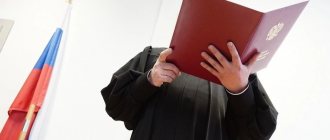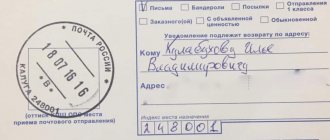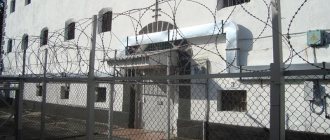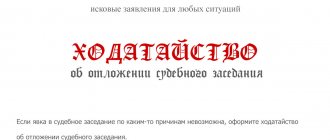On what grounds is a criminal case initiated?
According to the law, criminal prosecution can begin if the following conditions are met:
- the offender confessed to the crime;
- law enforcement agencies have received a report of a crime (already committed or about to be committed);
- a corresponding resolution from the prosecutor was sent to the preliminary investigation authorities.
The actions of the criminal must clearly show the signs and elements of a crime so that criminal prosecution can begin.
A criminal complaint may be made:
- directly from the victim;
- from third parties who became witnesses;
- from a law enforcement representative who filed a report or protocol (when the victim for some reason cannot leave a complaint on his own).
Such an appeal can be submitted both in writing and orally. In the latter case, the statement is drawn up by the police officer on duty based on the applicant’s words. In addition, in the Criminal Code there are a number of crimes for which criminal proceedings are opened automatically, upon their commission and regardless of the will of the victim.
How is a criminal complaint processed?
At the legislative level, there is a special procedure for registering requests to law enforcement agencies, which must be followed by a representative of the operational duty unit of internal affairs.
When it comes to a personal appeal from the victim or third parties, the applicant is given a certificate with the following information:
- the date the law enforcement officer received information about a crime committed or being prepared;
- the number that was assigned to the application and recorded in the registration log;
- details of the employee who accepted and registered the request.
Then the facts stated in the appeal are verified, which takes 3 days. In some cases, this period may be extended to 10 days by the head of the relevant investigative unit or inquiry body. If, during the preliminary inspection, the inquirer or investigator determines that there are grounds for a more thorough study of certain aspects (conducting audits, documentation), then he can appeal to superiors with a request to extend the period for studying the facts to 30 days.
After the information submitted by the victim has been verified, one of the following decisions is made:
- a resolution is written to begin criminal proceedings in the case (Article 140 of the Code of Criminal Procedure of the Russian Federation);
- a resolution is written to waive criminal prosecution (Article 148 of the Code of Criminal Procedure of the Russian Federation);
- The case materials are transferred either according to jurisdiction (to the bodies of inquiry or investigation, which is regulated by Article 151 of the Code of Criminal Procedure of the Russian Federation), or directly to the court when it comes to criminal cases of private prosecution (Article 20 of the Code of Criminal Procedure of the Russian Federation, part 2).
If the response period has expired and none of the above actions have occurred, then it makes sense to say that law enforcement officials are inactive. According to legislative norms, such cases can be appealed by contacting the authorities that control the activities of first-level law enforcement agencies.
Another dimension or stolen period of preliminary investigation
The legislator, in my opinion, expressed himself very clearly: “the period of preliminary investigation includes the time from the date of initiation of a criminal case until it is sent to the prosecutor with an indictment” (Part 2 of Article 162 of the Code of Criminal Procedure of the Russian Federation). But the investigation often lacks it. Not wanting to demonstrate their red tape or their incompetence to senior management, some investigators, and quite often, instead of extending the investigation period in a criminal case in the manner prescribed by law, simply steal it. Ask: - From whom can you steal the period of preliminary investigation?
Yes, of course, the accused in the case, who, by the way, is guaranteed by the Constitution the protection of rights and freedoms, as a citizen of the Russian Federation. Compliance with the period of preliminary investigation is an essential condition for ensuring the right of the accused to defense. Since the same Constitution guarantees him that in the administration of justice the use of evidence obtained in violation of Federal Law is not allowed. Evidence obtained outside the preliminary period established by law is precisely that.
How do the courts react to violation of the terms of the preliminary investigation? How they should react is specified in the Constitution of the Russian Federation. But judicial practice is ambiguous. Judges evaluate evidence not only on the basis of the law, but also according to their “conscience.” Yes, but everyone’s conscience is different.
I offer a striking example from my practice of conscientiously resolving such an issue. A criminal case against A. and Ch. was initiated on November 27, 2009. The period of preliminary investigation in the case - 12 months - expired on November 27, 2010. As can be seen from the case materials, during this period the preliminary investigation in the case was not suspended and the case was not sent to the prosecutor for approval of the indictment.
I think it's easy to count to twelve! Further extension of the period of preliminary investigation was to be carried out by the Chairman of the Investigative Committee at the Prosecutor's Office of the Russian Federation, the head of the investigative body of the relevant federal executive body (under the federal executive body) and their deputies (Article 162 of the Code of Criminal Procedure of the Russian Federation). It is clear from the case materials that, in violation of the requirements of Article 162 of the Code of Criminal Procedure of the Russian Federation, the period of preliminary investigation in the case was illegally extended to December 26, 2010 (for a period of over a year) not at the federal, but at the regional level.
An analysis of the case materials shows that this violation of the law became possible under the following circumstances: Resolution and. O. Head of the Investigation Department dated October 19, 2010, the criminal case was returned to the investigator for additional investigation and elimination of identified deficiencies (note that the case was not sent to the prosecutor).
It is clear from the resolution that no time limit for the preliminary investigation was established. 26.11. 2010 the criminal case was accepted for proceedings and. O. head of the investigative department, and the period of preliminary investigation was extended by an inappropriate official to actually 13 months, i.e. until December 26, 2010. It is unknown where the criminal case was pending for more than a month from 10/19/2010 to 11/26/2010 (one month and seven days). At the same time, the preliminary investigation was not suspended and investigative actions were not carried out during the specified period.
Since the expiration of the one-year preliminary investigation period in the case - November 27, 2010, further investigation into the case has been carried out illegally. But this is not the end of the story. The case file contains a report from the investigator, from which it follows that on December 22, 2010, she made a telephone call to the accused Ch., and he allegedly said that he could not appear on December 26, 2010 (the end date of the illegally extended investigation period) to participate in investigative actions on family matters. circumstances.
The information contained in the report is a deliberate falsification and does not correspond to reality. December 26, 2010 was Sunday, and the investigator did not need to carry out investigative actions personally with Ch., as evidenced by the fact that subsequent investigative actions with his participation were carried out only on February 17, 2011. Meanwhile, in the period from January 21, 2011 to February 17, 2011, the investigator carried out other investigative actions without his participation, which indicates that there were no legal grounds for suspending the investigation.
On December 22, 2010, the investigator did not contact Ch. by phone, and did not call for investigative actions as of December 26, 2010. On December 26, 2010, there were no family circumstances preventing Ch. from participating in the investigative actions. This circumstance is confirmed by the fact that the investigator’s report does not indicate exactly what family circumstances prevent his participation in the investigative actions. Based on this report, by resolution of December 22, 2010, the investigator unreasonably and illegally suspended the investigation of the case on the basis of clause 3, part 1, art. 208 Code of Criminal Procedure of the Russian Federation.
The decision to suspend the preliminary investigation in the case dated December 22, 2010 also does not indicate the circumstances in connection with which the accused Ch. could not participate in investigative actions; the case materials do not contain any evidence or documents confirming these circumstances. On January 21, 2011, the criminal case was again accepted for proceedings by the investigator, the period for the preliminary investigation on it was illegally set until February 21, 2011 and. O. head of the regional investigation department.
The investigator's falsification of the grounds for suspending the preliminary investigation and its illegal resumption led to a further violation of the deadline for the preliminary investigation in the case. It was during this period that the investigator ( outside the statutory period of preliminary investigation ) charged accused A. and Ch. on 02/17/2011, and they were interrogated as accused, then notified of the end of the preliminary investigation and familiarized with the case materials - 02/21/2011. On the same day, the criminal case was sent with an indictment to the prosecutor.
At the stage of preliminary investigation, appealing the actions of the investigation did not lead to legal results. All authorities, as if by agreement, insisted on one thing: the period of investigation begins to run from the moment the investigator accepts the criminal case for proceedings and there are no violations of the law in the actions of the investigator, he has the right to suspend the investigation of the case. Criminal prosecution of the investigator for falsification of case materials was refused. Finally, the case went to court.
At the preliminary hearing, the defense managed to prove to the judge that the case could not be considered by the court and a verdict could not be passed on it, since the charge was brought outside the legal period of the investigation. The case was returned to the prosecutor by a court order in accordance with Article 237 of the Code of Criminal Procedure of the Russian Federation (the judge could count to 12). At the same time, the state prosecutor did not agree with this court decision and told the defense, almost word for word: “Well, what else is needed, we gave you an answer that the time frame for the investigation in the case has not been violated”!
According to the cassation submission, the court's decision to return the case to the prosecutor was canceled and the case was returned for a new trial, but it went to another judge, about whom the investigator had previously mentioned that he would not pay attention to such trifles. The defense managed to overturn this composition of the court, but that's another story. The case was assigned to a third judge. It should be noted that the cassation ruling did not say that the terms of the investigation in the case were not violated. The cassation court wisely avoided this issue, pointing out that the case can be considered on its merits, excluding evidence obtained in violation of the law, and a verdict of guilty or acquittal can be made.
History has taken a new turn. Again, a motion was filed at the preliminary hearing to return the case to the prosecutor, on the same grounds. But this time there was a refusal in the spirit of a cassation ruling, however, the judge still indicated in the decision that the terms of the preliminary investigation had been violated in the case, as well as the possibility of excluding evidence. The cassation court upheld the ruling without changes.
The judicial investigation showed that a number of prosecution evidence was created artificially, in particular, witnesses were added who did not participate in the events and were in another place at that time, and the like. That is, there were all grounds for an acquittal. In the case, a motion was filed to exclude evidence and procedural documents obtained outside the investigation period.
Then there was a break of almost two weeks, apparently, the judge deliberated. After the break, with a shrug, he handed down a guilty verdict, albeit with a minimum sentence, and a decision to refuse the defense and the accused to exclude evidence, in which, contrary to a previously issued and valid decision (which has prejudicial significance), by the way, he indicated that violations of deadlines the investigation into the case was not allowed, since the duration of the investigation begins from the moment the investigator accepted the case for proceedings (a very vague statement that does not comply with the law). In the verdict, not even a hint was made about the arguments about violation of deadlines.
After reading the transcript of the trial, the defense and the accused were simply amazed. It’s not that it did not correspond to the course of the court hearings, in terms of the testimony of witnesses, they were simply stupidly copied from the indictment and brought into compliance with the court’s requirements. Comments on the protocol were submitted, but the results of their consideration are still unknown. The cassation court did not even turn its attention to all this disgrace, the reporter kept silent about it, they did not listen to the defense (everything is clear to them anyway), the verdict was upheld, only canceled in terms of satisfying the civil claim for compensation for moral damage.
Here is such an ordinary example of the strong guarantee of law enforcement officers acting in a single impulse - to resolve the case on the basis of the “law” and according to “conscience.” A further appeal against the verdict is currently being prepared. I wonder if maybe “They” are right and “We” are wrong?!
How long can an investigation take?
Unlike criminal proceedings, where deadlines are not clearly established, inquiry and investigation procedures have clear time frames. There are the following periods of investigation:
- General – no more than 2 months. The standard procedure assumes that the investigator has 2 months to carry out all investigative activities. The starting point is the moment of the beginning of criminal prosecution. The case materials are then sent to the prosecutor, who will submit them to the court.
- Private – up to 3 months (at the discretion of the head of the investigative authorities, if there is such a need) or up to 12 months (by decision of senior management, when the investigation concerns particularly complex crimes).
Other deadlines for the investigation of particularly serious or large-scale crimes are established by the Investigative Committee of the Russian Federation. When determining the duration for special cases, a special commission will take into account the complexity of the crime, the number of defendants, and the cruelty of their act.
Have a question for a lawyer? Ask now, call and get a free consultation from leading lawyers in your city. We will answer your questions quickly and try to help with your specific case.
Telephone in Moscow and the Moscow region: +7
Phone in St. Petersburg and Leningrad region: +7
Free hotline throughout Russia: 8 (800) 301-39-20
Since simpler cases are under the jurisdiction of the investigative bodies, the time frame allocated for investigative measures is much shorter:
- general – up to 1 month;
- private - up to 2 months or up to six months (extended at the request of the investigator by the prosecutor of the highest instance);
- extended - up to 1 year (only with the permission of the military prosecutor or the Investigative Committee of the Russian Federation).
The period for conducting investigative measures can be extended only if there are compelling reasons. This opportunity should not be used by investigators to delay the investigation.
Time frame for investigation
The investigation begins with filing a police report. The information presented is recorded in the appropriate journal and checked by an investigator within 3 days; if necessary, the period can be extended to 10 days. The verification of information ends with a decision to initiate proceedings in the case, a decision to refuse to initiate criminal proceedings, or a decision to transfer the case materials to the court.
If the 10-day period has expired and no resolution has been issued, you can talk about the inaction of law enforcement agencies and file a complaint with management.
Criminal proceedings, no matter how complex they may be, cannot be investigated forever. The legislation assigns 5 days for interested parties to familiarize themselves with the case materials. Based on the results of studying the information by those involved in the process, the investigator will draw up a protocol in which all contradictory points can be voiced in writing. The materials of the case, as a rule, are studied by the lawyers of the parties, but if the party does not find them during this time, then the state provides a defender of interests. If the criminal proceedings do not provide for the participation of a defense lawyer, the subjects of the criminal proceedings can familiarize themselves with the materials.
If a person is in a pre-trial detention center and refuses to familiarize himself with the case materials, the investigator sends an indictment to the prosecutor without introducing the accused.
The duration of a criminal trial, in contrast to the rather vague time frame of legal proceedings, has a clear picture. You can learn more about the established time limits for the investigation in Articles 162 and 223 of the Code of Criminal Procedure of the Russian Federation. There are three periods of consideration of the case:
- general period - no more than 2 months from the beginning of criminal proceedings until it is sent to the prosecutor's office;
- private - up to 3 months, if there is a need at the discretion of the head of the preliminary investigation body and up to 12 months, if there is an investigation of a particularly serious case;
- the maximum time is more than 12 months, can be increased only by decision of the Investigative Committee of the Russian Federation.
The duration of a case is influenced by many factors, such as the scale of illegal actions, the number of defendants in the case, and the complexity of the crime itself. The inquiry process has its own time frame - the general period lasts no more than 30 days, the private one can be extended by the prosecutor up to 6 months and the maximum period can be extended by the military prosecutor up to 12 months.
Time limit for the court verdict to enter into legal force
It is important to note that the period for investigating a case can be extended only if there are compelling reasons for this, and cannot serve as a tool for delaying the investigation or violating the principle of the inevitability of criminal liability for the crime committed.
How do the parties familiarize themselves with the case materials?
The victim and suspect have 5 days to familiarize themselves with the case materials. The countdown begins from the date specified by the investigator when transferring the files. Based on the results of the review, a protocol is written. In this document, participants in the process can set out those points with which they disagree.
If the suspect does not have a defense lawyer, then during the period allotted for familiarization with the case materials, he is provided with a state lawyer who will explain incomprehensible points. But if the presence of a defense attorney in the case is not necessary for such a crime, then the accused can familiarize himself with the results of the investigation on his own.
If the suspected person is not in the pre-trial detention center and does not appear at the station upon notification of the investigator without good reason, then after 5 days the indictment will be sent to the prosecutor for review and transfer of the case to the court, and the right to familiarize himself with the case materials will be lost.
The five-day deadline has both advantages and disadvantages. On the one hand, participants in the process have enough time to familiarize themselves with the case materials and prepare for court hearings. At the same time, this period creates the preconditions for corruption among officials, stimulates delays in the consideration of criminal cases, and allows interested parties to create schemes for illegal actions.
Therefore, despite the provisions of Article 217 of the Code of Criminal Procedure of the Russian Federation, the court may decide to appoint a special order - to establish a specific time period if it turns out that the accused is deliberately delaying the deadline for reviewing the case materials.
How much time is given to consider a criminal case in court?
The terms of trial in a criminal case are not limited in any way by the Criminal Code of the Russian Federation. This procedural measure was established to ensure that each party has the opportunity to protect its rights in court and ensure the appearance of important witnesses to testify.
According to Article 321 of the Code of Criminal Procedure of the Russian Federation, the judge appointed as the chairman of the case independently sets the date of the first hearing. At the same time, he takes into account the complexity and severity of the crime, the presence of special circumstances, and the volume of materials that will need to be reviewed. When making the final decision, the court's workload is also taken into account.
But still there are certain time limits. From the date of filing of documents in the trial court, the magistrate has 30 days to set a date for the first hearing. If the suspect is kept in a pre-trial detention center (such a preventive measure was chosen for him by law enforcement agencies), then this period is reduced to 14 days.
By law, a judge is obliged:
- ensure a comprehensive review of the evidence provided, the versions, the facts and the case as a whole;
- use legal methods of influencing the parties to the process.
Based on this, the code does not establish a strict time frame regarding the timing of consideration of a criminal case in the court of first instance. In addition, during the trial it is often necessary to resort to the services of independent experts to clarify the circumstances of the case. And the examination may require a certain amount of time.
Another comment on Article 222 of the Code of Criminal Procedure of the Russian Federation
1. The prosecutor, when sending the case to court, has the right to express his opinion on the advisability of considering the case in a closed court session due to the presence of at least one of the grounds listed in Part 2 of Art. 241 Code of Criminal Procedure. The prosecutor informs the court about this in a covering letter. The fact that the prosecutor’s signature on the letter confirms the information he is reporting, but does not replace the prosecutor’s approval of the indictment (BVS RSFSR. 1972. No. 5. P. 11).
2. Undoubtedly progressive is the indication in the law of the obligation of the prosecutor to notify the victim, civil plaintiff, civil defendant and (or) their representatives about sending a criminal case to court. At the same time, these persons are explained their right to file petitions for a preliminary hearing in the case in the manner prescribed by Chapter. 34 Code of Criminal Procedure.
3. Unlike the original wording, the updated part 2 of the commented article now clearly states that a copy of the indictment with attachments is handed over to the accused by the prosecutor. If the accused is kept in custody, Part 3 of the commented article provides for the procedure for the delivery of these documents on behalf of the prosecutor by the administration of the place of detention.
4. The commented article has been supplemented with Part 4, the like of which was not previously contained in the criminal procedural laws of Russia. The essence of these innovations is that if the accused refuses to receive a copy of the indictment by failure to appear when summoned or otherwise, the prosecutor sends the criminal case to the court indicating the reasons why a copy of the indictment was not served on the accused.
5. The provision providing for the possibility of handing over a copy of the indictment to the victim and the defense attorney, subject to their requests, remained unchanged. The victim (unlike the defender), as a rule, is not aware of the existence of such a right. Therefore, the prosecutor should be guided by the need to check the explanation of this right by investigators, who often do not do this. And it is not indicated in the list of procedural rights of the victim (see Part 2 of Article 42, Appendix 53 to Article 476).
How to appeal a court decision
If one of the parties does not agree with the decision of the court of first instance, then it can protest the verdict by filing an appeal. This is a time-limited right - a review of the decision can be applied for before the verdict comes into force. Depending on the authority to which the appeal will be filed, the time frame differs:
- district court – up to 15 days;
- regional, regional, supreme court of the republic - up to 30 days;
- Supreme Court of the Russian Federation – up to 45 days.
An appeal can be filed by persons who participated in the criminal proceedings in the court of first instance. One or the other party can challenge the decision of the first or second (appellate) instance. Such a request is considered:
- 1 month in other cassation courts;
- up to 2 months in the Supreme Court of the Russian Federation.
The main condition for filing an appeal is compliance with the deadlines for preparing and filing a complaint. If the allotted time has been missed, the applicant may apply for a renewal of the time limit. However, he must have compelling reasons for skipping, supported by documents.
Commentary on Article 222 of the Code of Criminal Procedure of the Russian Federation
1. In the covering letter about sending the case to court, it is advisable for the prosecutor to express his opinion on the advisability of a closed trial, on the consideration of the case in absentia in accordance with Art. 247 and on the application of a special procedure for judicial proceedings, since Part 1 of Art. 314 of the Code of Criminal Procedure requires the prior consent of the state prosecutor. The prosecutor sends the case against the accused, with whom a pre-trial cooperation agreement has been concluded, to the court with a presentation. See Art. 317.5 and com. To her.
2. After the adoption of Federal Law No. 87-FZ dated 05.06.2007, the prosecutor’s obligation to serve a copy of the indictment is not supported by sufficient powers: the prosecutor does not have the right to call the specified persons to appear or apply coercive measures; The prosecutor's instructions to the investigator are not mandatory. Sending a copy of the indictment by mail does not always allow you to verify its receipt on time. It seems necessary to establish the obligation for the investigator to carry out the prosecutor’s order to hand over a copy of the indictment. The administration of the place of detention is obliged to hand over to the accused the correspondence received for him within 3 days (Part 5 of Article 20 of the Federal Law of July 15, 1995 N 103-FZ).
3. The prosecutor has the right to send the case to court without delivering a copy of the indictment to the accused if the latter has evaded this (Part 4 of Article 222 of the Code of Criminal Procedure). This rule is similar to the failure of the accused to familiarize himself with the materials of the completed investigation under Part 5 of Art. 215 of the Criminal Procedure Code, therefore must be applied subject to the same conditions. About them see com. to part 5 art. 215. In particular, the prosecutor does not have the right to send the case to court when the accused has disappeared or for other reasons his whereabouts have not been established (except for the case provided for in Part 5 of Article 247). The Plenum of the Armed Forces of the Russian Federation indicates: in each specific case, the court must find out for what reasons the accused was not given a copy of the indictment (indictment), whether the refusal to receive it was formalized in writing, whether the fact of failure to appear when called was documented, etc. <1>. If the accused refuses to receive a copy of the indictment, then it seems necessary to send such a copy to his defense lawyer.
——————————— <1> See: paragraph 15 of the Resolution of the RF PVS No. 1 and paragraph 15 of the RF PVS Resolution No. 28 of December 22, 2009 “On the application by courts of the norms of criminal procedure legislation governing preparing a criminal case for trial” // BVS RF. 2010. N 2.
The commented norm, allowing for the possibility of sending a criminal case to court without serving the accused with a copy of the indictment if he has evaded receiving it, does not deprive the accused of the right, if he has the appropriate expression of will, to receive this document (Determination of the Constitutional Court of the Russian Federation of June 23, 2005 N 264- ABOUT).







